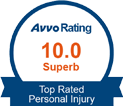In most instances, when a drunk driver causes an accident, it is the passengers or occupants of the other vehicle who suffer the worst injuries. The person who is under the influence of alcohol may escape unharmed. Many people have had to deal with the aftermath of car accidents caused by drunk drivers. If you suffer catastrophic injuries in a car accident, your family would have to put the pieces of their lives back together again. You may have to spend vast amounts of money seeking medical treatment and physical therapy. You may never be able to work again and earn a living the way you used to before the accident. If you or a loved suffers injuries in a car accident caused by a drunk driver, you can file a personal injury lawsuit against the driver. The Personal Injury Attorney Law Firm can help you seek compensation for damages suffered.
Overview of Car Accidents Caused by Drunk Drivers in California
If you suffer injuries in a car accident caused by an intoxicated or drunk driver, you have a legal right to seek compensation. For you to file a civil lawsuit against the driver, the driver does not need to have received a DUI conviction. You will only need to prove that the drunk driver was negligent at the time of causing the accident and inflicting your injuries. A driver is negligent if it is evident that he/she failed to use reasonable care to prevent causing harm to other road users.
According to California law, a car driver may be negligent "per se" if he/she violates specific statutes. For instance, the law deems a driver to be automatically negligent if the driver operates a vehicle under the influence of alcohol as outlined under California "Vehicle Code 23152(a)." A driver is also negligent if he/she operates a vehicle with a BAC (blood alcohol concentration) of .08% and above. A driver may also be negligent under "VC 23612(a)" for refusing to submit to a DUI chemical test while operating a vehicle.
For you to seek damages after suffering injuries in a car accident caused by a drunk driver, you have to prove two elements. First, you have to prove that the driver acted negligently. You also have to prove that as a result of the negligence of the driver, you suffered injuries or damages. It must be evident that the accident resulted from drinking by the other driver. It does not matter which DUI law the drunk driver violated as long as you can prove that you suffered injuries due to the defendant's negligence. It is upon the judge to determine whether the defendant's drunk driving caused the car accident. It is also the job of your injury attorney to prove to the judge if the accident occurred due to the negligence of the drunk driver.
It is important to note that the defendant/drunk driver does not have to be guilty of DUI as a requirement or prerequisite for filing a personal injury lawsuit in California. This fact holds because in California, civil liability laws and criminal laws have varying burdens of proof, and the rules serve different purposes. For instance, criminal laws aimed at punishing offenders. For example, criminal DUI laws aim at punishing drivers who operate vehicles while intoxicated. Before punishing the offenders under criminal law, there must be proof of guilt beyond doubt, and the judges involved must agree. On the other hand, the main aim of civil liabilities is to compensate/console victims of wrongful acts. To establish liability in a civil case, all which is necessary is a "preponderance of the evidence."
In a car accident caused by a drunk driver, the "preponderance of the evidence" means that most likely, the defendant operated a vehicle under the influence of alcohol and caused injuries to the plaintiff.
What If a DUI Conviction Exists?
If a conviction for DUI exists, it is easy to prove the negligence of the drunk driver. A DUI conviction is enough proof that the driver was "negligent per se." According to California law, violation of rules and statutes qualifies as "per se negligence." The drunk driver (defendant) may be able to plead for lower charges like dry reckless charges instead of DUI charges. However, no matter how minor the DUI offense is, it is still a violation of statutes and qualifies as per se negligence. However, it is essential to note that the fact that a driver is liable for causing a car accident while drunk does not imply that the driver is guilty of DUI.
In fighting charges, the drunk driver may state that the accident did not occur due to his/her impairment. The defendant may, therefore, argue that his/her impairment did not lead to the victim's damages, and he/she is not responsible for the damages. The defendant may also argue that the victim's injuries did not occur from the accident.
Why is a Drunk Driver Likely to Cause an Accident?
If a driver has a high blood alcohol concentration, the driver will have a decreased ability to maintain control of his/her car. The overall judgment of a drunk driver is poor while the driver is behind the wheel, and the reaction time of the driver is also impaired. A drunk driver may assume that he/she is fit to operate a vehicle without realizing that alcohol has significantly impaired his/her ability to operate a vehicle. A person under the influence of alcohol does not have the same capabilities to operate a motor vehicle as a sober person.
It is also common for drunk drivers to engage in other risky activities that may lead to an accident. The activities may include driving on the wrong side of the road or speeding. It may be hard for other drivers and passengers to detect a drunk driver. Therefore, the other road users may not have adequate time to defend themselves from an accident likely to be caused by a drunk driver.
What if you are Partly at Fault in an Accident?
Although the other driver was drunk at the time of the accident, it does not automatically mean that the driver is entirely to blame for the accident or 100% at fault. The state of California recognizes and follows the "comparative fault." Also called "shared fault" or "comparative negligence," "comparative fault" entails apportioning liability depending on the degree of fault. The judge may allocate fault between two or additional parties involved in an accident, depending on the degree of fault. However, unlike in some other states, the state of California does need the defendant to be 50 percent or more at fault for the victim to seek compensation. Therefore, even if the drunk driver is partially at fault, you may still file a personal injury lawsuit and seek compensation for the injuries.
If a Drunk Driver's Insurance Viable?
If you suffer injuries in a car accident caused by a drunk driver, you may be wondering whether an insurance company covers the drunk driver. In the state of California, most car insurance policies pay compensatory/economic damages in case the policyholder injures another party when the policyholder is drunk. Therefore, this implies that it will be possible to recover compensatory damages like medical bills incurred in seeking treatment for injuries suffered.
The source for compensatory damages compensation may be the drunk driver "third-party car liability insurance." The policy will offer compensation up to the set limits. You may also get compensation from your own "uninsured/underinsured motorist insurance policy." What if no insurance covers the accident? In this case, you may choose to sue the drunk driver directly. You may also decide to sue the drunk driver directly if the aggregate/comprehensive policy limits are not enough to cover the damages you suffer in a car accident.
Can You Sue for Punitive Damages?
Yes, you can sue for punitive damages. However, you should note that according to public policy in California, the meeting of punitive damages by the insurance company is prohibited. Therefore, while seeking punitive damages awards, you have to seek compensation directly from the drunk driver. You may not successfully get punitive damages compensation if the defendant had little assets to cover the punitive awards. However, for compensatory/economic damages like medical bills and vehicle repair costs, the insurance company is authorized to pay. If you are wondering whether to seek punitive damages compensation or not, you may seek legal counsel. An experienced personal injury lawyer will assess the assets and the financial capability of the defendant and advise you whether to seek punitive damages or not.
What Should You Do After an Accident?
If a drunk driver hits you, the first thing that you need to do is contact the police if you are in a position to do so. The effective way to show that the other driver was operating a vehicle under the influence is through a police report or chemical test results if the police administer one. Other things that you need to do after a car accident include:
Remain at the Accident Scene
Especially if you or other people have suffered injuries, it is essential to first remain at the scene of the accident. If you leave the scene of the accident immediately after the accident, it may be hard to prove that the other driver was drunk and also to prove the level of fault. Staying at the scene of the accident will also prevent false implications of hit and run charges.
Seek Medical Treatment if Necessary
If you have suffered injuries that require immediate medical attention, you should seek medical attention. You do not have to wait for the police if your injuries are severe and require immediate care. You may call the police or request another person to call the police on your behalf but proceed to seek medical attention immediately. If another person is taking you to the emergency room, ensure that you leave behind your details, including your contact details with the other drivers.
Gather Information
After getting in an accident with a drunk driver, ensure that you gather as much information as possible. Some of the crucial details that you should capture include the license plate of the other vehicle (s) involved in the accident. Ensure that you also capture the model, make, year of manufacture, color, and other important details of the other vehicle (s). If you are in a position, ensure that you get the other vehicle's Vehicle Identification Number (VIN). For you to report the accident appropriately as outlined by the California Department of Motor Vehicles, you will need to capture all these details.
Where will you get the other vehicle's Vehicle Identification Number? You can get the identification number from the other driver's insurance card. However, you should ensure that you physically confirm the vehicle identification number, especially if the other driver is not insured. However, if the other driver fails to cooperate, do not attempt to get the vehicle identification number against their will. The driver may decide to accuse of touching his/her vehicle without their consent. Other areas from which you can get the vehicle identification number includes on the inside of the driver's door. You may also get the vehicle identification number on the driver's side dashboard.
Exchange Contact Information
If other drivers and witnesses are present at the scene of the car accident, it is advisable to exchange contact information with them. The chances are high that after the police come, the crowd that may have gathered after the accident will disperse. In this crowd, there may be some witnesses who may have seen what happened at the time of the accident. You may require their witnesses' statements at the time of filing a personal injury lawsuit. It is, therefore, essential to ensure that you get their contact details.
If a law enforcement officer comes to the scene, ensure that you speak to him/her and note down his/her name as well. You will need these details when filing for a personal injury lawsuit. Even as you ask for information from the other drivers, you should also provide your personal information to them if the request even if the drunk driver requests for your personal information, ensure that you give it to him irrespective of who is at fault for the accident.
Do Not Say that you are Not Hurt
After getting involved in a car accident, you may not feel hurt at first. However, even if you feel okay, you should avoid telling the other driver that you are fine or that you have not suffered any injuries. The other driver may use these statements against you if you attempt to seek compensation at a later date. You should also note that immediately after an accident, your body gets a rush of adrenaline. Therefore, you may not realize that you have suffered injuries immediately after an accident happens. It is only later that you may start to experience the effects of the accident.
You may also have suffered soft-tissue injuries, and these injuries are not always immediately evident. If you assert that you have not suffered injuries, you will be giving the drunk driver and his/her insurance company an excuse to deny you a claim or to offer you less compensation than what you are worth. However, you should also avoid lying about suffering injuries if you have not suffered any injuries. Lying about injuries suffered may greatly lower your credibility. To avoid any form of controversy, you should state that you need to seek medical attention to establish the extent of damages suffered.
Do Not Admit Fault
If you get into a car accident with a drunk driver, it does not mean that the drunk driver is 100% responsible for the accident. To some level, you may also be partly to blame for the accident. It is crucial to ensure that you do not admit fault at the scene of the accident, even if you feel that you are partly to blame. Avoid apologizing as this is a way of showing that you are to blame for the accident. It is common for the other driver and his/her insurance company to use your apology as an excuse proving that you are at fault and deny your compensation. Avoid asking if the other driver has suffered injuries or if he/she needs medical attention. If the other driver puts pressure on you and urges you to take the blame for the accident, tell the other driver to contact your insurance company but do not admit fault under any circumstances.
Common Injuries in Accidents Caused by Drunk Drivers
A drunk driver can easily lose control of his/her vehicle. Therefore, in case of an accident, diverse injuries are likely to result, and most of the injuries may be severe or even fatal. If you suffer injuries in a car accident caused by a drunk driver, the injuries may have ripple effects throughout your life. You may experience severe pain and incur hefty medical expenses. When under the influence of alcohol, drivers also tend to engage in reckless driving, including excessive speeding. At the time of the accident, the drunk driver may not even realize that he/she was dangerously operating the vehicle.
Some of the injuries that may result from an accident caused by a drunk driver include traumatic brain injuries and fractures. Other injuries may include broken bones and spinal cord injuries and paralysis. Burns, scarring, lacerations, and internal bleeding and brain damage may also result. After you suffer serious injuries in a vehicle accident, you may not realize it until you go to the hospital to get further medical attention. Therefore, even if you feel fine after an accident, it is important to seek medical attention from a qualified professional. It is better to be safe than sorry because seeking timely diagnosis may prevent the injuries suffered from progressing. The medical report will also come in handy when seeking compensation for injuries suffered in a vehicle accident.
Seeking Compensation for Injuries
After suffering injuries in a car accident caused by a drunk driver in California, you may seek compensation for both economic damages and non-economic damages. Some of the damages for which you can get compensation include:
Medical Expenses
This is compensation for the amount of money spent on seeking medical treatment for the injuries suffered in a car accident. When seeking compensation, it is essential to consider both current and future costs. If you have suffered severe injuries like broken bones, you are likely to need may need months of physical therapy after completing the initial treatment. Therefore, consider every aspect of the treatment, including rehabilitation and any medication and other medical supplies you may need concerning the treatment.
Vehicle Damage
Your vehicle may be greatly damaged in the car accident. You may seek compensation for the costs incurred in repairing the vehicle. You do not have to meet the vehicle repair expenses, yet the accident is the fault of the other driver.
Lost Wages
You may not be able to go to work or engage in income-generating activities after suffering injuries in a vehicle accident. It is, therefore, essential to seek compensation for lost wages. This would refer to the income you may have earned if you did not suffer injuries in the accident. In some instances, the other driver's insurance company may request evidence of your employment income.
Lost Earning Capacity
Other compensation may include the loss of earning capacity. This is the inability to earn money in the future. If you suffer catastrophic injuries in a vehicle accident, you may not be able to work in the future. Even if you can work, you may not earn the money you used to earn before the accident. You may seek compensation for this loss.
You may also seek compensation for non-economic damages like pain and suffering, lack of enjoyment in life, and emotional distress.
Contact a Personal Injury Lawyer Near Me
If you have suffered injuries in a car accident caused by a drunk driver, The Personal Injury Attorney Law Firm can help you file a personal injury lawsuit. Contact us at 619-625-8707 and speak to one of our attorneys today.
 800-492-6718
800-492-6718







